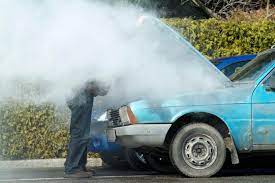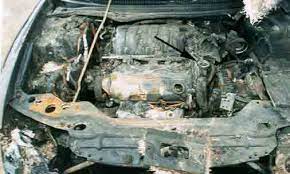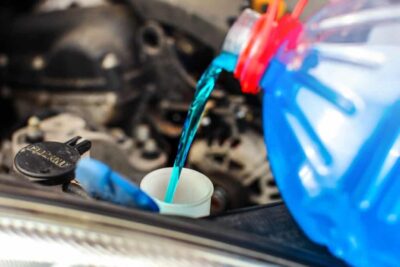Are you curious about the flammability of your car’s coolant? Is coolant flammable? Coolant serves a crucial role in fire prevention by regulating the temperature of your car’s engine and preventing it from overheating. While it does have a high boiling point and can reach temperatures that can cause burns, it is not combustible.
Coolant is generally not flammable, but some types of coolant can be combustible under certain circumstances. The most common type of coolant used in automobiles is ethylene glycol, which is not highly flammable.
However, it can be combustible if it is mixed with certain substances or if it is heated to a high temperature. It is important to handle coolant carefully and to follow the manufacturer’s instructions for its use and storage.
Can coolant catch fire or explode?

It is unlikely that the coolant itself will catch fire or explode. Coolant is a liquid that is used to transfer heat away from mechanical components in a vehicle or other equipment. It is not flammable under normal circumstances, and it does not produce a flame when it is ignited.
However, coolant can become combustible if it is mixed with other substances that are flammable, such as gasoline or oil. In these cases, the mixture may be able to catch fire or explode if it is exposed to a spark or other ignition source. It is important to handle coolant and any substances that it is mixed with care to prevent the risk of fire or explosion.
Is it safe to use flammable coolants in vehicles?
It is generally not safe to use flammable coolants in vehicles. Coolant is used to transfer heat away from mechanical components and to keep the engine at a safe operating temperature. If the coolant is flammable, it could ignite and cause a fire or explosion, which could be dangerous for the vehicle’s occupants and cause damage to the vehicle.
Most vehicles are designed to use a specific type of coolant, and it is important to use the correct type of coolant to ensure the proper functioning of the cooling system. It is generally recommended to use a coolant that is specifically designed for use in vehicles, such as ethylene glycol or propylene glycol. These types of coolants are not flammable and are safe to use in vehicles.
What are the risks of using flammable coolants?
Using flammable coolants in a vehicle or other equipment can pose a number of risks. Some of the potential risks of using flammable coolants include the following:
1. Fire or explosion: If the flammable coolant comes into contact with an ignition source, it could catch fire or explode, which could be dangerous for the vehicle’s occupants and cause damage to the vehicle.
2. Damage to the cooling system: Flammable coolants may not be compatible with the materials used in the cooling system, and they could cause damage to the system over time. This could lead to costly repairs and downtime for the vehicle.
3. Reduced cooling performance: Flammable coolants may not be as effective at transferring heat as non-flammable coolants, which could lead to overheating and damage to the engine.
It is generally recommended to use a coolant that is specifically designed for use in vehicles, such as ethylene glycol or propylene glycol. These types of coolants are not flammable and are safe to use in vehicles.
How do you handle a coolant fire in an automotive engine?
If a coolant fire occurs in an automotive engine, it is important to act quickly to extinguish the fire and prevent it from spreading. Here are some steps you can take to handle a coolant fire in an automotive engine:
1. Turn off the engine: If the engine is still running, turn it off as soon as possible. This will help to reduce the risk of the fire spreading or becoming more intense.
2. Remove any flammable materials: If there are any flammable materials near the engine, such as gasoline or oil, move them away from the area.
3. Use a fire extinguisher: If you have a fire extinguisher on hand, use it to extinguish the fire. Aim the nozzle at the base of the flames and use a sweeping motion to cover the entire area.
4. Call for help: If the fire is not extinguished or if it starts to spread, call the fire department for assistance.
It is important to handle a coolant fire carefully and to follow proper safety procedures to prevent injury and damage. If you are not confident in your ability to extinguish the fire, it is best to leave the area and call for help.
What are the potential consequences of using flammable coolant in a vehicle?
Using flammable coolant in a vehicle can have serious consequences. Some of the potential consequences of using flammable coolant in a vehicle include:
1. Fire or explosion: If the flammable coolant comes into contact with an ignition source, it could catch fire or explode, which could be dangerous for the vehicle’s occupants and cause damage to the vehicle.
2. Damage to the cooling system: Flammable coolants may not be compatible with the materials used in the cooling system, and they could cause damage to the system over time. This could lead to costly repairs and downtime for the vehicle.
3. Reduced cooling performance: Flammable coolants may not be as effective at transferring heat as non-flammable coolants, which could lead to overheating and damage to the engine.
4. Legal consequences: In some cases, it may be illegal to use flammable coolant in a vehicle. This could result in fines or other legal consequences.
It is generally recommended to use a coolant that is specifically designed for use in vehicles, such as ethylene glycol or propylene glycol. These types of coolants are not flammable and are safe to use in vehicles.
Are there any non-flammable alternatives to traditional coolants?

Yes, there are non-flammable alternatives to traditional coolants that can be used in vehicles and other equipment. Some examples of non-flammable coolants include:
Ethylene glycol: This is the most common type of coolant used in automobiles. It is a non-toxic, non-flammable liquid that is effective at transferring heat and preventing freezing.
Propylene glycol: This is another non-toxic, non-flammable coolant that is often used in place of ethylene glycol. It is less toxic than ethylene glycol, but it is also less effective at transferring heat and preventing freezing.
Water: Water can be used as a coolant in some cases, although it is generally not as effective as other types of coolant. Water has a high heat capacity and can transfer heat away from mechanical components, but it can also boil and vaporize at high temperatures.
It is important to use the correct type of coolant for the specific application to ensure proper performance and safety. It is generally recommended to use a coolant that is specifically designed for use in vehicles, such as ethylene glycol or propylene glycol.
Can flammable coolants cause engine damage?
Flammable coolants may be more likely to cause engine damage than non-flammable coolants. This is because flammable coolants may not be as effective at transferring heat and preventing overheating as non-flammable coolants. If the engine becomes too hot, it can suffer damage to the internal components, such as the pistons, cylinders, and bearings.
In addition, flammable coolants may be more corrosive than non-flammable coolants, which could lead to corrosion and wear on the engine and other mechanical components. This could also result in costly repairs and downtime for the vehicle.
It is generally recommended to use a coolant that is specifically designed for use in vehicles, such as ethylene glycol or propylene glycol. These types of coolants are not flammable and are safe to use in vehicles. They are effective at transferring heat and preventing overheating, which can help to protect the engine and other mechanical components from damage.
How can you prevent coolant fires in your vehicle?
There are several steps you can take to prevent coolant fires in your vehicle:
Use the correct type of coolant: It is important to use the correct type of coolant for your vehicle. Most vehicles are designed to use a specific type of coolant, and it is important to use the correct type to ensure the proper functioning of the cooling system.
1. Follow the manufacturer’s instructions: Follow the manufacturer’s instructions for the use and storage of coolant. This will help to ensure that the coolant is used safely and effectively.
2. Check for leaks: Regularly check your vehicle’s cooling system for leaks. If you notice any leaks, have them repaired as soon as possible to prevent coolant from spilling onto hot surfaces or coming into contact with ignition sources.
3. Keep flammable materials away from the engine: Keep flammable materials, such as gasoline or oil, away from the engine to reduce the risk of a fire.
By following these steps, you can help to prevent coolant fires and ensure the safety of your vehicle.
What are the proper storage and handling precautions for flammable coolants?
Proper storage and handling of flammable coolants are important to prevent accidents and injuries. Here are some precautions to follow when storing and handling flammable coolants:
1. Store flammable coolants in a cool, dry place: Flammable coolants should be stored in a cool, dry place away from heat sources and ignition sources. They should also be stored in a well-ventilated area to prevent the build-up of flammable vapors.
2. Keep flammable coolants in approved containers: Flammable coolants should be kept in containers that are approved for flammable liquids. These containers should be labeled with the appropriate hazard warning labels, such as “Flammable,” “Combustible,” or “Explosive.”
3. Handle flammable coolants with care: When handling flammable coolants, be sure to follow proper safety procedures. Wear protective clothing, such as gloves and eye protection, to prevent contact with the skin and eyes. Avoid smoking or using open flames in the area where the coolant is being handled.
4. Follow the manufacturer’s instructions: Follow the manufacturer’s instructions for the use and storage of flammable coolants. This will help to ensure that the coolant is used safely and effectively.
By following these precautions, you can help to prevent accidents and injuries when storing and handling flammable coolants.
How do you dispose of flammable coolants safely?

Proper disposal of flammable coolants is important to prevent accidents and protect the environment. Here are some steps you can take to dispose of flammable coolants safely:
1. Check local regulations: Check with your local authorities to find out about the regulations for disposing of flammable coolants in your area. Some jurisdictions may have specific requirements for the disposal of flammable liquids.
2. Follow the manufacturer’s instructions: Follow the manufacturer’s instructions for disposing of the coolant. This may include information on the proper disposal methods and any precautions that should be taken.
3. Use approved containers: Use containers that are approved for flammable liquids to store the coolant until it can be disposed of. These containers should be labeled with the appropriate hazard warning labels, such as “Flammable,” “Combustible,” or “Explosive.”
4. Dispose of the coolant at an approved facility: Dispose of the coolant at a facility that is approved for the disposal of flammable liquids. This may include a hazardous waste facility or a recycling center that is equipped to handle flammable materials.
By following these steps, you can dispose of flammable coolants safely and in accordance with local regulations.
Recommended:
What are the regulations and laws surrounding the use of flammable coolants in vehicles?
The regulations and laws surrounding the use of flammable coolants in vehicles vary by jurisdiction. In some areas, it may be illegal to use flammable coolants in vehicles. In other areas, there may be specific requirements for the use of flammable coolants, such as labeling requirements or restrictions on the types of vehicles that can use flammable coolants.
It is important to check with your local authorities to find out about the regulations and laws that apply to the use of flammable coolants in your area.
Generally, it is recommended to use a coolant that is specifically designed for use in vehicles, such as ethylene glycol or propylene glycol. These types of coolants are not flammable and are safe to use in vehicles. They are also more widely available and may be easier to find than flammable coolants.
Conclusion
This page on is coolant flammable reveals all you need to know about coolants. Truly coolant is generally not flammable. The most common type of coolant used in automobiles, ethylene glycol, is not highly flammable.
However, coolant can be combustible if it is mixed with certain substances or if it is heated to a high temperature. It is important to handle coolant carefully and to follow the manufacturer’s instructions for its use and storage.
Using flammable coolants in a vehicle can pose serious risks, including the risk of fire or explosion, damage to the cooling system, and reduced cooling performance. It is generally recommended to use a coolant that is specifically designed for use in vehicles, such as ethylene glycol or propylene glycol. These types of coolants are non-flammable and safe to use in vehicles.

